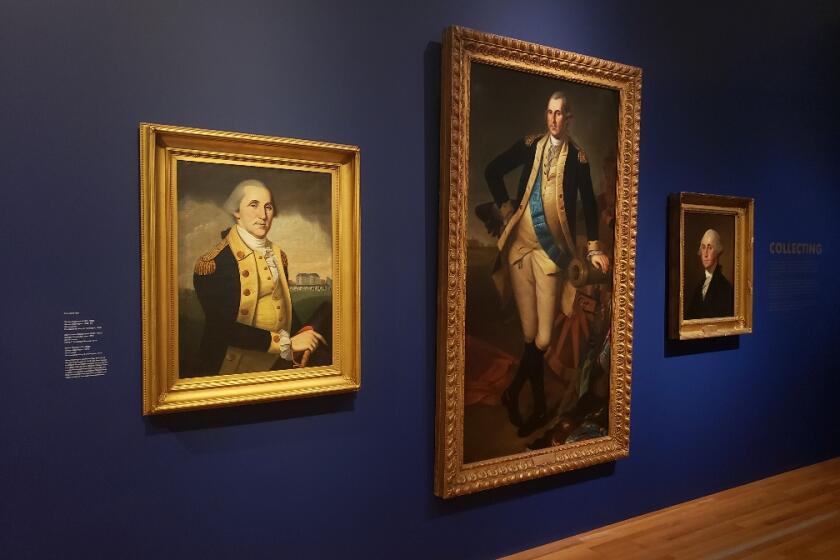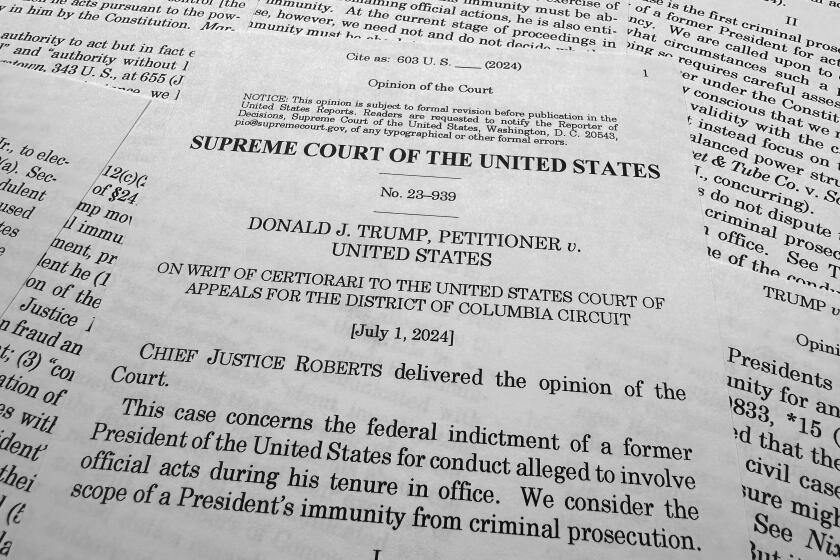The American presidency is the most powerful job in the world. Too powerful

- Share via
Like a compulsive gambler, the United States keeps raising the stakes on decisions made by inherently fallible humans. When, inevitably, those humans make bad choices bringing calamitous results, we criticize those decisions and ladle out blame, but we are much less likely to question the wisdom of granting individuals so much power in the first place.
We should. Our nation’s founders had no illusions about preventing bad choices. Instead, they sought to limit individuals’ power and its resulting harm.
They’re busy being dead, but we can still ‘listen’ to Jefferson, Madison, Adams, Franklin and Washington.
In July, the Supreme Court held that presidents are absolutely immune for crimes they may commit using many of their official powers, and they are at least presumptively immune from criminal prosecution for any official actions. Many have criticized the court for presuming to rewrite the Constitution: The founders created constitutional immunity for members of Congress for things they say in speeches and debates on the House and Senate floors but declined to go further and offer any such immunity to presidents.
Arguably the immunity decision’s bigger shortcoming is its heavy reliance on the wisdom and probity of one person. The founders rightly regarded all humans, especially those in authority, as vulnerable to temptation and corruption. Although they cheered King William III’s leadership of England’s Glorious Revolution, they criticized his aggrandizement of power — which later proved dangerous in the unstable hands of King George III. Accordingly, they designed the U.S. Constitution with many checks and balances on the president.
Today’s president is far more powerful than the one the Constitution’s writers envisioned and specifically declined to immunize. The focus on the executive and the executive branch is in some ways to be expected: The founders had no way to anticipate how large the federal government would become with the country’s growing territory, population, economic complexity and global ties. But they would surely be appalled, nonetheless.
The Republican-appointed majority’s rhetoric says the president isn’t above the law, but its decision in Trump’s immunity case says otherwise.
For example, the Constitution explicitly makes the president the nation’s commander in chief. That would seem to be the founders’ conferring a great deal of power on the office, until you remember that initially, the U.S. had no standing army. The founders also explicitly assigned war powers to collective decision-making (Congress), not to an individual (the president). But from the Korean conflict through Vietnam, the Iraq war and beyond, a diffident House and Senate have essentially handed that power over to the White House.
Had Madison, Washington, Jefferson and the others had any idea how much power would find its way to the presidency, they would have increased the Constitution’s checks and balances.
Gun safety is another example of how we keep raising the stakes on fallible human decisions. In this case, an aggressive Supreme Court and a diffident Congress have made it possible for almost anyone to purchase what are tantamount to weapons of war. Assault-style rifles radically increase the consequences of bad decisions by gun owners compared with the weapons available when the 2nd Amendment was ratified.
California may enforce its recent ban on guns in some ‘sensitive places,’ but not others, a three-judge panel of the U.S. 9th Circuit Court of Appeals ruled Friday.
Even if the founders meant to convey individual rights to private possession of weapons — a historically dubious claim — the 2nd Amendment certainly does not guarantee the right to possess any weapon one chooses. (As an analogy, consider the 6th Amendment: It guarantees a criminal defendant the right to some lawyer but not the lawyer of their choice.)
A person who owns a gun is keeping and bearing arms. This is true even if they are denied the weapon of their choice. Any plausible 21st century gun safety legislation would allow possession of arms far deadlier than those known to the 2nd Amendment’s drafters, yet the Supreme Court keeps raising the stakes. One result: A federal district court judge in late August felt compelled by recent Supreme Court decisions to throw out charges against a man possessing a machine gun, which has been illegal since 1934. Fallible humans with machine guns are a lot scarier than fallible humans with flintlock rifles.
This parliamentary trick has mostly been used to thwart anti-slavery, anti-lynching and civil rights bills. Why are some Democrats defending this tradition?
Persistent liberal calls to wipe out the Senate filibuster — allowing whichever party sweeps an election to reshape the government with no need to compromise — are another example of recklessly raising the stakes on human decision-making. The filibuster isn’t in the Constitution, but since the first session of the Senate, in 1789, it’s been possible for the minority to stand in the way of the majority and force compromises in Congress. Proponents of killing the filibuster imagine they could do great things if freed from the need for the bipartisanship that the filibuster forces, but just as surely, generations of progress on civil rights, environmental protection and workplace safety could be washed away after a single wave election.
Finally, as we have concentrated power in the White House, we have raised the stakes for presidential elections, with the result that ruthlessness in election campaigns and vote certification is soaring. Objectively, picking the wrong president has gotten more and more dangerous, and that unleashes subjective passions, along with outrageous and illegal partisan behavior — up to and including the Jan. 6 insurrection — that perpetrators justify because they are trying to prevent the “catastrophe” of a win by their opponent.
Inevitably, humans will make bad decisions. We should do what we can to stop or reverse laws and practices that concentrate power, especially over life and death or crucial rights — in one imperfect individual or just a few. We can lower the stakes, demand that Congress do its job rather than cede more power to the executive, and reinforce checks and balances. The founders were right about a lot of things, but especially that human beings are fallible.
David A. Super teaches at Georgetown Law.
More to Read
A cure for the common opinion
Get thought-provoking perspectives with our weekly newsletter.
You may occasionally receive promotional content from the Los Angeles Times.













